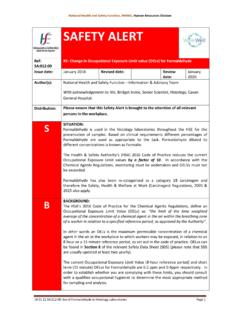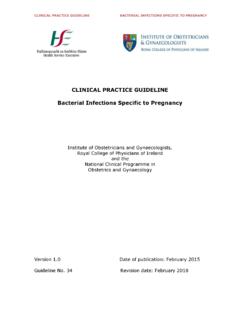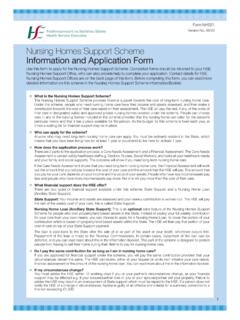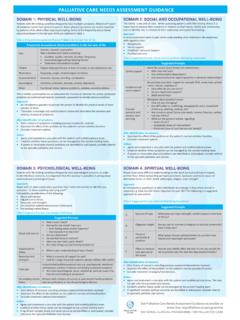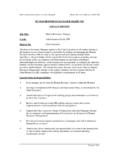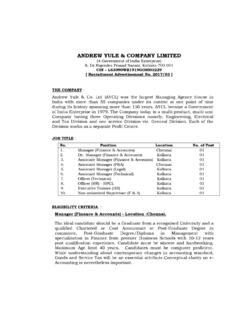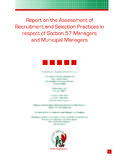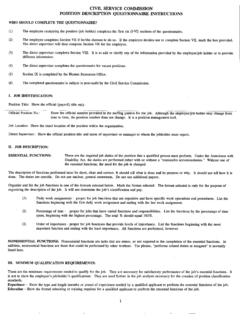Transcription of POLICY ON ACTING P IN A H CAPACITY - Ireland's …
1 POLICY ON ACTING -UP IN A HIGHER CAPACITY JANUARY 2010 Page 2 of 8 HSE POLICY on ACTING -Up in a Higher CAPACITY (January 2010) 1. Scope The ACTING -Up POLICY applies to all HSE employees and to all grades of staff. It has immediate effect and replaces all previous instructions in operation at Area and former health boards. Applications for approval of ACTING -up arrangements must be made in accordance with the procedures set out in this document. The application form to request an ACTING -up appointment is outlined in Appendix 1. Payment for ACTING -up arrangements must also comply with the rules set out in this document. This POLICY will operate within the parameters of Government POLICY on such matters. 2. Purpose of this Document The purpose of this document is to set out the standard national POLICY and procedures to be applied when making ACTING -up appointments and, where appropriate, the remuneration arrangements when employees are to be paid for ACTING at a higher level.
2 This POLICY should be considered in line with the National Financial Regulations Payroll - NFR 03. 3. Definitions of ACTING -up ACTING -up is where an employee is required to act as a substitute for another employee in a higher grade when s/he is absent from work, when the substantive post-holder is absent due to annual leave, sick leave, maternity leave, career break, etc., or where the post is vacant pending its permanent filling. In the case of permanent vacancies, there must be an intention to fill the vacancy if an ACTING -up arrangement is to be put in place. Managers are required to give careful consideration to all alternative means of covering vacancies which arise before seeking approval for ACTING -up arrangements. The decision to appoint an employee to act-up in a higher grade requires the sanction of the Regional Director of HR and the Area Assistant National Director of Finance.
3 This sanctioning process will require evidence that all alternative options, including redeployment, reallocation of responsibilities amongst existing employees, reorganization of work, etc, were fully exhausted before a request for an ACTING -up appointment was made. The approval of an ACTING -up arrangement in accordance with this POLICY should not be considered as conferring support or sanction for consequential ACTING -up arrangements. 4. Criteria to be applied when considering a requirement to pay an ACTING -up allowance Managers when reviewing vacancies and making assessments as to whether or not there is a requirement to appoint a staff member to act-up from their substantive grade to a higher grade for a defined period of time must consider and meet in full the criteria outlined below and also include on the appended application form*: Needs Assessment: There must be a clear need to fill the post/position left vacant due to short-term nature of the absence of the post-holder.
4 In the case of posts vacated due to retirement/resignation/ reassignment, the post must: i. Continue to be a funded post. Page 3 of 8 HSE POLICY on ACTING -Up in a Higher CAPACITY (January 2010) ii. There must be intent to fill at the grade and role performed by the previous post-holder and the need for the post continues into the future. iii. The time-frame for filling must not extend to longer than six months from time of vacancy. Redeployment of staff / Reorganisation of work: Following the completion of a needs assessment for the post, redeployment of existing staff and/or reorganisation of existing work should be the first action, regardless of the likely duration of the vacancy. The following questions should be posed and answered: i. Is there an existing post holder at the same level, or at a higher level, in the immediate functional area that can have their area of responsibility extended to embrace the vacated position without a need to seek a post holder at a lower grade to fill the vacancy on an interim basis?
5 Ii. Is there an existing post holder at the same level or at a higher level, in the wider area that can have their area of responsibility extended to embrace the vacated position without a need to seek a post holder to fill the vacancy? iii. Can the tasks performed by the previous post holder be sub-divided and shared by other staff at their current grades and levels of responsibility? iv. Is the post likely to be impacted by reorganisation or transformation agenda in the short to medium term? The suggested timeframe here is within the next 12 months. *If a business case needs to be submitted in support of an ACTING -up appointment, all of these headings must be addressed. 5. Selection Process for ACTING -up Appointments The employee who is selected for ACTING -up must have all the competencies, qualifications, experience, and if necessary the appropriate registration, to enable them to carry out the ACTING -up role effectively.
6 If the employee is not fully qualified for the ACTING role it must be restricted accordingly and alternative arrangements made to ensure full compliance. (i) ACTING appointments Less than 3-months ACTING -up appointments which are short-term, for 3-months or less or which arise at short notice should be filled in accordance with the principles of the Code of Practice Atypical Appointments in the Civil Service and Certain Public Bodies*, fairness, merit and transparency. While these vacancies may be filled locally, without going through the formal recruitment process, consideration must be given to the widest possible pool of potentially qualified candidates. The selection criteria must be based on the essential requirements of the post . (ii) ACTING appointments Greater than 3-months Where the ACTING -up period is for greater than 3-months, or where there is sufficient time to formally advertise and undertake the formal selection process, the ACTING -up vacancy should be filled in compliance with the Code of Practice - Appointments to Positions in the Civil Service and Certain Public Bodies*.
7 This will include advertising the vacancy, issuing a job specification, interviews and formally appointing the successful candidate subject to receipt of appropriate clearances. The selection procedure and the rationale for decisions must be clearly documented, including information on the numbers of applicants and the assessment and appointment stages. * Additional information on the application of these Codes to particular situations is available from the Area Recruitment Manager Page 4 of 8 HSE POLICY on ACTING -Up in a Higher CAPACITY (January 2010) 6. Payment for ACTING -up The comprehensive rules governing the payment of the ACTING -up allowance are outlined in the HSE Terms and Conditions of Employment Rulebook. When these qualifying conditions are met, the general rules for remunerating employees that are ACTING -up in a higher post are as follows: (a) The minimum of the scale for the higher post, or the current ACTING -up allowance, whichever is the more favourable.
8 (b) The ACTING -up allowance is set out in the Consolidated Salary Scales. (c) The rate of remuneration of a substitute should in no case exceed the maximum salary point of the higher post. (d) Calculation of premium payment during periods of ACTING -up should be calculated on the basis of basic pay (substantive post) plus the ACTING -up allowance. (e) An employee ACTING in a higher post will continue to progress incrementally on their substantive scale under normal incremental arrangements in addition to receiving the ACTING -up allowance. Managers should monitor the ACTING up payments to employees upon incremental progression to ensure that the employee continues to receive the most favourable ACTING up payment, an employee who is on the first point of the scale in which they are ACTING up may upon incremental progression in their substantive post surpass the amount of the first point in the higher grade .
9 In such instances the employee should be paid on the relevant point of their substantive grade plus the ACTING up allowance going forward. 7. Management / Administrative Grades grade VIII and higher and equivalent senior grades in other staff categories. As a general principle, it is expected that senior managers across all staff categories, in line with this POLICY , may be required to provide cover in the absence of their colleagues, or to cover vacant senior posts pending their filling, at their own grade or higher in the context of their managerial function without receiving an ACTING -up payment. Any derogation from this general principle will require a full business case to be submitted, in addition to the standard application form associated with this POLICY , which must be endorsed by the appropriate Regional Director of Operations and submitted to the National Director of Human Resources and the Director of Finance for their approval.
10 8. Other Conditions of Employment Employees who are ACTING -up will retain the terms and conditions of their substantive post (except for the ACTING -up allowance, where appropriate). 9. Subsequent Promotion In addition to the normal pay on promotion rules, in situations where an employee is subsequently promoted to a higher post immediately following a continuous period of ACTING -up in that post, s/he will receive incremental credit in respect of the continuous period of ACTING -up, which will be effective from the date of appointment to the higher grade post, there will be no back-payment made to an employee in respect of the time spent ACTING -up. In addition this service will be reckonable for the granting of service related annual leave entitlements. Page 5 of 8 HSE POLICY on ACTING -Up in a Higher CAPACITY (January 2010) 10.
